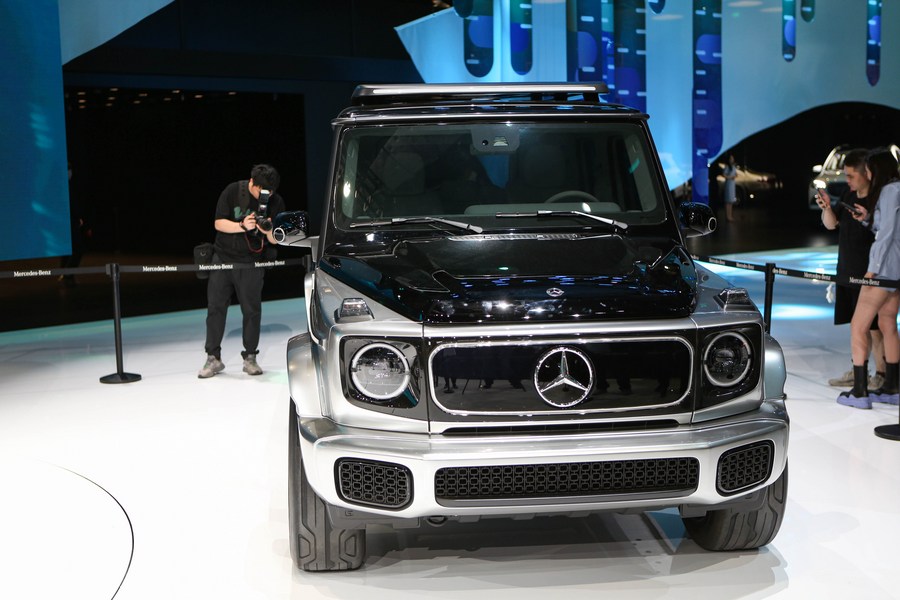Global auto enterprises keen to attend CIIE on huge Chinese market

A concept car of Mercedes-Benz is displayed at the 20th Shanghai International Automobile Industry Exhibition in Shanghai, east China, April 18, 2023. (Xinhua/Xin Mengchen)
Global automakers are keen to attend this year's China International Import Expo (CIIE) held in Shanghai from November 5 to 10, seeking to tap the huge Chinese market as the country continues to open its doors wider to the world.
As active participants of this year's CIIE, global automakers including Volkswagen Group, General Motors (GM), Toyota Motor Corp., BMW Group, and Tesla Inc. brought their latest cutting-edge new energy technologies and latest new energy vehicle (NEV) models.
In the first nine months of this year, the production and sales of NEVs amounted to 6.31 million and 6.28 million respectively, up 33.7 percent and 37.5 percent year on year, with the market share reaching 29.8 percent, according to statistics from China Association of Automobile Manufacturers (CAAM). International auto executives attending the CIIE expressed optimism about the potential for continued growth in China's NEV market.
-- New NEV models debuted at the expo
At Tesla's exhibition booth, the new car model Model Y became a hot spot for car enthusiasts. The auto parts of the new car model including body coverings, front and rear trunk covers, front and rear doors, front and rear suspension assembly, battery packs and its 19-inch wheels were demonstrated to the audience.
This year marks the 10th anniversary of Tesla entering the Chinese market. Tesla has not only participated in China's domestic market, but also become an important part of China's new energy industry. It works with local Chinese enterprises to help the development of China's automobile industry and economic globalization, said Tao Lin, vice president of Tesla.
Volkswagen brought a series of NEVs to the expo, including its pure electric sedan ID.7. According to its plan, the ID.7 will land in China with two exclusive models. If Volkswagen can maintain a competitive advantage in China, it will certainly gain a greater competitive advantage in other markets, said Ralf Brandstätter, Chairman and CEO of Volkswagen Group China.
The Durant Guild, GM's high-end imported car and lifestyle platform, brought five iconic products to the expo and showed the product selection plan for the Chinese market. The CIIE has provided a unique platform for direct communication with potential customers, through which companies could accurately grasp the demand of the market, said Julian Blissett, Executive Vice President and President of GM China.
-- Toyota and BMW shows cutting-edge hydrogen technology
International automakers that are optimistic about the Chinese market brought cutting-edge new energy technologies as well.
China has built more than 400 hydrogen refueling stations, with 280 in operation, ranking first in the world. The cumulative number of fuel cell vehicles has exceeded 13,000, ranking third worldwide. Among them, the number of commercial fuel cell vehicles is the highest in the world, said Jiang Lijun, vice president of the China Renewable Energy Society.
BMW's iX5 hydrogen fuel cell vehicle made its debut at the CIIE this time. The car combines sustainable concepts, technological innovation, and world-class engineering design, demonstrating BMW's leading research and development capacity in electric drive technology. The high-performance hydrogen fuel cell can accelerate to 100 kilometers per hour in 6 seconds, with a maximum range of up to 504 kilometers.
This year, BMW's tests in several countries have proven that hydrogen fuel cell vehicles could perform well in different weather and geographical conditions, further validating the feasibility of hydrogen energy as an important choice in the future field of electric mobility, said a BMW representative.
Toyota showcased a series of technology application scenarios such as manufacturing, transportation, storage, and use of hydrogen energy. At Toyota's booth, the company presented a lighter, larger-capacity storage tank for large commercial vehicles and a replaceable hydrogen cylinder integrated storage module that can achieve faster hydrogen refilling and longer range.
-- International giants partner with Chinese companies for joint development
In addition to making sparkling presence at the CIIE, global auto companies are also partnering with Chinese industrial chain companies to seek new development.
The intelligent cockpit products developed by CARIAD China, a software company under Volkswagen, in cooperation with the listed company ThunderSoft, will begin mass production and installation in vehicles from 2025 to 2026, said Chang Qing, CEO of CARIAD.
Chang also revealed that the joint venture between CARIAD China and Horizon Robotics is expected to be established before the end of 2023 and plans to mass produce L2+ and L2++ level intelligent driving assistance system products from 2025 to 2026.
On November 5th, Toyota and Pony.ai jointly launched Robotaxi, their first pure electric autonomous taxi, at CIIE. Produced by the bZ4X pure electric vehicle platform, it will be equipped with the seventh-generation L4-level automatic driving passenger car software and hardware system developed by Pony.ai.
This is the latest development following the announcement in August this year by Pony.ai, Toyota China, and GAC Toyota to establish a joint venture to promote the large-scale deployment of Robotaxis. Currently, the three parties have started collaborative research and development around this Robotaxi model, pushing forward with styling design, vehicle platform development, and the research and manufacture of autonomous driving systems.
The Chinese auto market is developing at an unprecedented speed. Electrification and intelligence is leading the new trend of the NEV industry. Toyota's cooperation with Pony.ai is an important measure to tap potential in Chinese market, said Tatsuro Ueda, Chairman of Toyota Motor (China) Investment Co., Ltd.
(Edited by Tian Shenyoujia, tianshenyoga0524@163.com)


